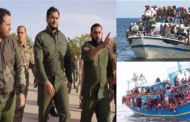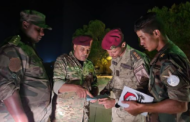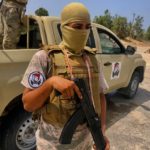In Benghazi, demonstrators took to the streets in Benghazi on September 10 to protest against deteriorating living conditions in the country.
In Sirte, the Libyan Army Spokesman said that the Libyan Army forces udetected yet another breach by Khalifa Haftar’s forces. The spokesman of the Libyan National Army (LNA) denied the allegations.
At the international level, a statement following the meeting in Bouznika on September 10, reports the delegates had agreed on the criteria for the appointment of key posts. Meanwhile, talks in Montreux, Switzerland reportedly lead to a positive understanding between the parties.
The European Union reportedly is planning to remove the Speaker of House of Representatives in Tobruk Aqila Saleh from its sanctions blacklist to encourage peace efforts.
ABU GREIN
- the Libyan Army under the command of the Government of National Accord has seized a helicopter (MI35) for Khalifa Haftar’s forces in southern Abu Grein; western Sirte.
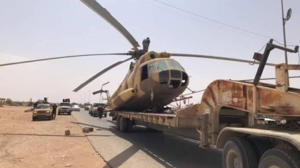
BENGHAZI
- demonstrators took to the streets in Benghazi on September 10 to protest against deteriorating living conditions in the country. Demonstrators closed Gamal Abdel Nasser Street in downtown Benghazi and burned tires near the Sports City conjunction.
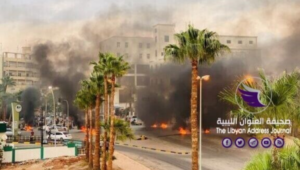
DERNA
- a merchant ship carrying jet fuel to Libya from the United Arab Emirates was stopped and inspected by European Union authorities on September 9 to determine whether the vessel had breached a United Nations arms embargo, EU officials said. Two frigates stopped the Royal Diamond 7 roughly 150 kilometers north of the Libyan city of Derna in the Mediterranean Sea.
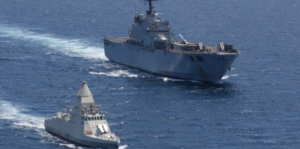
JUFRA
- the spokesman of the Libyan National Army (LNA), Major General Ahmed al-Mesmari, has denied allegations that LNA has violated the ceasefire, instead accusing militias of the Government of National Accord (GNA) of advancing towards the city of Jufra.
SIRTE
- the Libyan Army Spokesman, Colonel Mohammed Gununu, said that the Libyan Army forces under the command of the Government of National Accord (GNA), have detected yet another breach by Khalifa Haftar’s forces, which is the fourth since the announcement of the ceasefire. Gununu added that Haftar’s forces fired a bombardment of Grad missiles aimed at army positions west of Sirte in the early hours of September 8 morning.
INTERNATIONAL RELATIONS
- following the meeting in Bouznika on September 10, HoR’s Idris Omran read out a joint statement to reporters saying the delegates had agreed “the criteria, transparent mechanisms and objectives” for key posts. He did not give further details but said the two sides would meet again during the last week of September;
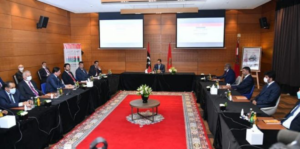
- Russian Deputy Foreign Minister and Special Presidential Representative for the Middle East and Africa, Mikhail Bogdanov, and Turkey’s Ambassador to Russia, Mehmet Samsar, confirmed their coordination efforts to assist in achieving a ceasefire in Libya;
- the Spokesman for the Turkish Foreign Ministry, Hami Aksoy, reiterated his country’s appreciation at Morocco’s constructive position in resolving the present Libyan crisis, saying in a statement that Turkey has reiterated, from the outset, its complete support for a political process between both Libyan sides, in accordance with the relevant Security Council Resolutions, to solve the Libyan crisis;
- the European Union is planning to remove the Speaker of House of Representatives in Tobruk Aqila Saleh from its sanctions blacklist to encourage peace efforts and ensure the EU plays a central role in any negotiated settlement, three diplomats said, according to Reuters on September 9;
- the consultations among key Libyan stakeholders that took place in Montreux in Switzerland under the auspices of the Centre for Humanitarian Dialogue and in the presence of UNSMIL between 7-9 September have ended in agreement on a road map for a comprehensive solution to the conflict;
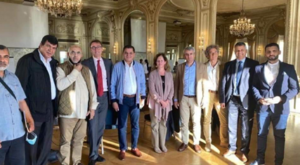
- the Arab League has called on Turkey to stop its interference in Libya’s affairs, withdraw all its forces without restriction or condition and immediately stop all hostilities directed at Arab countries;
- David Schenker, assistant secretary of state for Near Eastern affairs, emphasized that “it is not possible to resolve the Libyan conflict militarily,” but at the same time indicated that the “complex” Libyan scene has turned into something resembling a second Syria;
- the US AFRICOM Commander Stephen Townsend discussed on September 9 key security issues with Minister of Defense of Libya’s Government of National Accord, including counterterrorism efforts and security sector reform. The US embassy in Libya said in a statement that during his visit to Tunisia, US Africa Command Commander Stephen Townsend and the US Ambassador to Libya, Richard Norland, discussed recent political and security developments in Libya;
- the delegations of the High Council of State (HCS) and the Tobruk-based House of Representatives (HoR) have disclosed that “important achievements and understandings” have been reached between both parties in the first round of sessions that took place in the Moroccan Bouznika, notably, defining important criteria for ending the state of institutional division, putting an end to corruption, and the waste of public money;
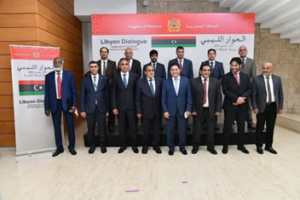
- on September 8, the U.S. Embassy echoed that general sentiment saying it ‘‘shares the UN’s confidence that Libyan talks in Morocco will have a positive impact on UN-facilitated and Libyan-led political dialogue’’. Meanwhile, while there are no official updates from the talks, leaked reports say the discussions are ongoing about the appointment of the key seven sovereign positions;
- on September 8, the League of Arab States (LAS), called on the two Libyan parties presently meeting in Morocco, to engage with all good faith, in the efforts to reach a national and united solution to the present crisis in Libya, beneath the auspices of the United Nations (UN);
- Algerian Foreign Minister Sabri Boukadoum declared his country’s refusal to supply arms to Libya, pointing out that dialogue between the Libyan parties is the only solution to the crisis. The Algerian minister also revealed that his country and Tunisia were seeking to host a meeting to launch political dialogue between the parties engaged in the Libyan crisis;
- the Community of Sahel-Saharan States (CEN-SAD) has welcomed the inter-Libyan talks, which kicked off in the coastal town of Bouznika, south of Rabat on September 6, at the initiative of the Moroccan government. In a statement on September 7, the CEN-SAD emphasized it is following with “particular attention and great satisfaction” the talks between members of the High Council of State and the Tobruk-based parliament;
- in response to questions related to the inter-Libyan dialogue in Rabat (Bouznika) Morocco, involving delegations from the High State Council (HSC) and the House of Representatives (HoR), the spokesperson of the United Nations Secretary-General said on September 7 that ‘‘The Secretary-General is supportive of all initiatives that would advance and complement the ongoing peace efforts spearheaded by the Berlin Conference on Libya of January 2020’’;
- the Head of the Libyan Presidential Council of the Government of National Accord (GNA) Fayez al-Sarraj met on September 7 with the Spanish Foreign Minister Arancha González Laya in Tripoli and discussed cooperation in economic development and service sectors;
- the Russian Foreign Minister Sergey Lavrov said Libyan conflict parties will meet in Moscow to find common ground for a solution, but he set no date for the meeting. Lavrov added that Russia backs up unconditional and immediate ceasefire in Libya.



